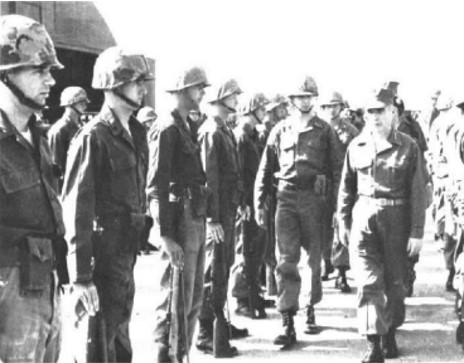President Johnson Approves an Expansion of the Marines’ Mission
April 5, 1965

U.S. military commanders request an expansion of the Marine Corps’ defensive mission at Da Nang so that they can pursue enemy forces in more offensive actions. Lyndon Johnson approves this request and also agrees to send two additional deployments of Marines to Da Nang. The Marines based at Da Nang are now authorized to pursue Communist forces away from American bases.
On the same day, Johnson asks National Security Advisor McGeorge Bundy to draft National Security Action Memorandum 328 to explain the president’s rationale for these decisions. Johnson signs the memo the next day, but does not make it public, distributing it only to his top cabinet officials. The president’s actions allow for the first official American offensive ground operations in Vietnam.1
There is much historical debate surrounding Lyndon Johnson’s incremental escalation of the Vietnam War between the fall of 1964 and the summer of 1965. Specifically, historians attempt to explain the president’s repeated choices to escalate U.S. involvement in Vietnam, rather than to withdraw or leave South Vietnam to fight on its own.
Various scholars point to at least two assumptions held by the Johnson administration that seem to explain the president’s decisions for war. First, that the White House fears “losing” Vietnam will cost the administration political capital and credibility in the United States, which Johnson believes will sink his Great Society program and civil rights legislation. Second, that the fall of South Vietnam to communism will represent a failure on the part of the United States to live up to its international obligations, and that it will lead to the Communist domination of most, if not all, of Asia. These outcomes are unacceptable to the White House, given the contemporaneous conditions of the Cold War.
Some historians argue that the Johnson administration, given the information and assumptions to which it reasonably has access at the time, feels it has no choice but to step in to prevent the fall of South Vietnam. Thus, these scholars note that it is hard to expect Johnson to act differently than he does. Other researchers, especially more recently, disagree with this argument, which they sometimes call the “inevitability thesis.” They counter that Johnson has choices other than continuing the war, and that he is consciously aware of these choices as late as the winter of 1965. According to these scholars, the United States’ credibility—and that of Johnson himself—is not on the line in 1964–1965, neither at home nor abroad, and it is not necessarily true that the president’s domestic reforms will be doomed by the collapse of the Saigon government. Further, they say, it is possible or even likely that the men in the administration understand these conclusions, given what they already know.
The historical discussion over Johnson’s decisions for war remains an ongoing debate among scholars.
Dallek, Robert. “Fear, Ambition, and Politics” in Robert J. McMahon, ed., Major Problems in the History of the Vietnam War, 4th ed. Boston and New York: Houghton Mifflin Company, 2008.